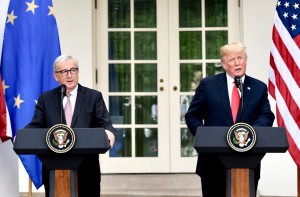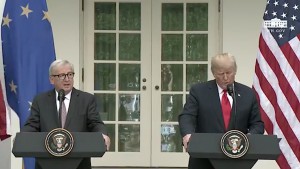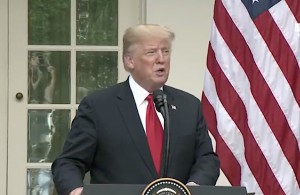
European Union Commisson President Jean-Claude Juncker, left, and President Donald Trump reached a truce on tariffs.
President Donald Trump and a key representative of the European Union appear to have a reached a temporary cease fire in trade by agreeing to discuss the possibility of removing all tariffs and subsidies on automobiles.
In what the EU chief called a “major concession,” U.S. President Donald Trump agreed on Wednesday to refrain from imposing car tariffs while the two sides launch negotiations to cut other trade barriers, easing the threat of a transatlantic trade war, according to Reuters.
After a meeting at the White House, Trump and European Commission President Jean-Claude Juncker said the talks would also seek to “resolve” U.S. tariffs on steel and aluminum and Europe’s retaliatory duties — marking a step back from Trump’s signature import protections for American metals producers, Reuters said.
Reuters also noted that Trump said Europe has agreed to increase purchases of U.S. liquefied natural gas and lower trade barriers to American soybeans, aiding U.S. farmers and the energy sector, Trump said.
(Automakers warn Trump administration about tariff impact. Click Here for the story.)
As outlined in the communiqué, the negotiations could open the door to eliminating the so-called chicken tax the 25% tariff levied on light duty trucks imported into the United States, which observers have said has discouraged anyone thinking of exporting trucks to the U.S.
Given the law of unintended consequences that seems to prevail in the unfolding fight over trade issues, the discussions also could put the state and local subsidies states such as South Carolina, Georgia, Alabama, Tennessee and Mississippi have used to attract automotive investment in jeopardy.
The Europeans haven’t taken up the issue but the Canadians, at the urging of Unifor, the Canadian union representing autoworkers, have raised the issue in the past and could raise it again.
The temporary truce came on the heels of a report in the Washington Post that Trump has been leaning towards imposing tariffs on automobiles made outside the United States even though members of his inner circle have said the tariffs were a bad idea.
(Click Here to see why NAFTA talks are halted — for now.)
Trump also has had to offer farmers more than $12 billion in subsidies to replace the income they stand to lose during the unfolding trade war that has already disrupted commerce with some the U.S. largest training partners such as Mexico, Canada and China.
Roughly 47% of the cars sold in the U.S. are imported and the tariffs have been vigorously opposed by the auto industry and its allies in Congress. The U.S. Senate also has gone on record with a bi-partisan resolution opposing the tariffs.
Meanwhile, the auto industry has mounted a full-court press on Capitol Hill and across Washington.
General Motors CEO Mary Barra told analysts that she spends a great deal of time on the tariff issue but has no idea on what’s going to happen. She made it clear that she was very concerned about the North American Free Trade Agreement, which plays a large role in GM operations. “We think it’s important to modernize NAFTA,” she said.
(To see more about the auto industry uniting to challenge Trump tariffs, Click Here.)
Ford CEO Jim Hackett said during the quarterly conference call with analysts, Ford has learned over the years to live with a variety of trading regimes and structures. Ford can live with different kinds of trading systems. “But we do need consistency,” he said.


